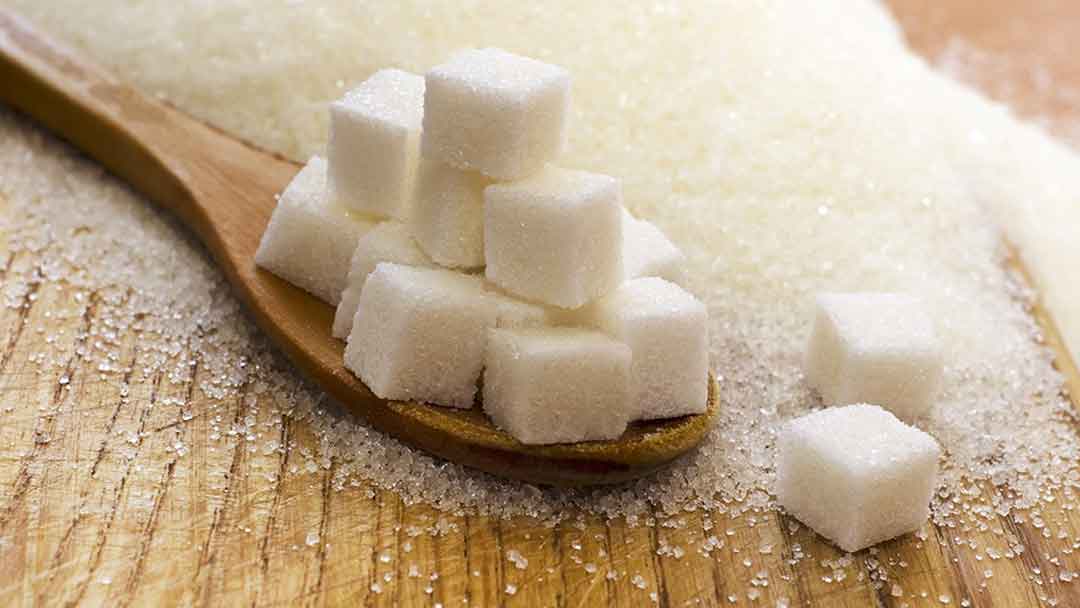How Sugar Ruins Your Health

- Sugar can suppress the immune system.
- Sugar upsets the minerals in the body.
- Sugar can cause hyperactivity, anxiety, difficulty concentrating, and crankiness in children.
- Sugar produces a significant rise in triglycerides, a leading cause of heart disease.
- Sugar contributes to the reduction in defense against bacterial infection.
- Sugar can cause kidney damage.
- Sugar reduces high density lipoproteins.
- Sugar leads to chromium deficiency.
- Sugar leads to cancer of the breast, ovaries, intestines, prostate and rectum.
- Sugar consumption is the top cause of type II diabetes, as it increases levels of glucose and insulin.
- Sugar causes copper deficiency.
- Sugar interferes with absorption of calcium and magnesium.
- Sugar raises the level of neurotransmitters called serotonin
- Sugar weakens eyesight.
- Sugar can cause hypoglycemia (low blood sugar levels).
- Sugar can produce an acidic stomach.
- Sugar can raise adrenalin levels in children.
- Sugar malabsorption is frequent in patients with functional bowel disease.
- Sugar consumption can cause aging.
- Sugar consumption can lead to alcoholism.
- Sugar consumption is the top cause of tooth decay.
- Sugar use contributes to obesity.
- High intake of sugar increases the risk of Crohn’s Disease, and ulcerative colitis.
- Sugar can cause changes associated with gastric or duodenal ulcers.
- Sugar can cause arthritis.
- Sugar can cause asthma.
- Sugar can cause candida albicans (yeast infections).
- Sugar can cause gallstones to form.
- Sugar can cause heart disease.
- Sugar can cause appendicitis.
- Sugar can cause multiple sclerosis.
- Sugar can cause hemorrhoids.
- Sugar can cause varicose veins.
- Sugar can elevate glucose and insulin responses in oral contraceptive users.
- Sugar can lead to periodontal disease.
- Sugar can contribute to osteoporosis.
- Sugar contributes to saliva acidity.
- Sugar can cause a decrease in insulin sensitivity.
- Sugar leads to decreased glucose tolerance.
- Sugar can decrease growth hormone.
- Sugar can increase cholesterol.
- Sugar can increase the systolic blood pressure.
- Sugar can cause drowsiness and decreased activity in children.
- Sugar can cause migraine headaches.
- Sugar can interfere with the absorption of protein.
- Sugar causes food allergies.
- Sugar can contribute to diabetes.
- Sugar can cause toxemia during pregnancy.
- Sugar can contribute to eczema in children.
- Sugar can cause cardiovascular disease.
- Sugar can impair the structure of DNA.
- Sugar can change the structure of protein.
- Sugar can make our skin age by changing the structure of collagen.
- Sugar can cause cataracts.
- Sugar can cause emphysema.
- Sugar can cause atherosclerosis.
- Sugar can promote an elevation of low density proteins (LDL).
- Sugar can increase free radicals in the blood stream.
- Sugar can cause overeating.
(A selection from Suicide by Sugar by Nancy Appleton, Ph. D and G. N. Jacobs. References here.)
A Must Watch: Is Sugar Toxic?
In this 60 Minutes piece, Sanjay Gupta reports on new research showing that beyond weight gain, sugar can take a serious toll on your healthy
Transcript available here.
Further Reading
The Diet Cure
The Craving Cure
The Mood Cure
Sugar & Heart Disease
Explosive evidence incriminating sugar as the chief architect of heart disease comes from the University of Hawaii (1972):
CC Brooks and his associates fed pigs high-sugar diets. Sixty-eight of the eighty pigs developed heart disease in the left half of the heart. This backs up the contention that Dr. Yudkin and others have been making for many years. A remarkable added finding was that in pigs in which 10 percent of the sugar was replaced by coconut oil or beef tallow, the heart remained free from the endocarditis that afflicted the [other] animals. This may confound those who have been apprehensive about fat in the diet.”
-Edward Howell, M.D., from the book “Enzyme Nutrition” (available from Price-Pottenger Nutrition Foundation here.)
Suicide by Sugar References
- Sanchez, A., et al. Role of Sugars in Human Neutrophilic Phagocytosis, American Journal of Clinical Nutrition. Nov 1973;261:1180_1184. Bernstein, J., al. Depression of Lymphocyte Transformation Following Oral Glucose Ingestion. American Journal of Clinical Nutrition.1997;30:613.
- Couzy, F., et al.”Nutritional Implications of the Interaction Minerals,” Progressive Food and Nutrition Science 17;1933:65-87.
- Goldman, J., et al. Behavioral Effects of Sucrose on Preschool Children. Journal of Abnormal Child Psychology.1986;14(4):565_577.
- Scanto, S. and Yudkin, J. The Effect of Dietary Sucrose on Blood Lipids, Serum Insulin, Platelet Adhesiveness and Body Weight in Human Volunteers, Postgraduate Medicine Journal. 1969;45:602_607.
- Ringsdorf, W., Cheraskin, E. and Ramsay R. Sucrose,Neutrophilic Phagocytosis and Resistance to Disease, Dental Survey. 1976;52(12):46_48.
- Yudkin, J., Kang, S. and Bruckdorfer, K. Effects of High Dietary Sugar. British Journal of Medicine. Nov 22, 1980;1396.
- Albrink, M. and Ullrich I. H. Interaction of Dietary Sucrose and Fiber on Serum Lipids in Healthy Young Men Fed High Carbohydrate Diets. American Journal of Clinical Nutrition. 1986;43:419-428.
- Pamplona, R., et al. Mechanisms of Glycation in Atherogenesis. Med Hypotheses. Mar 1993;40(3):174-81.
- Kozlovsky, A., et al. Effects of Diets High in Simple Sugars on Urinary Chromium Losses. Metabolism. June 1986;35:515_518.
- Takahashi, E., Tohoku University School of Medicine, Wholistic Health Digest. October 1982:41:00
- Kelsay, J., et al. Diets High in Glucose or Sucrose and Young Women. American Journal of Clinical Nutrition. 1974;27:926_936.
- Thomas, B. J., et al. Relation of Habitual Diet to Fasting Plasma Insulin Concentration and the Insulin Response to Oral Glucose, Human Nutrition Clinical Nutrition. 1983; 36C(1):49_51.
- Fields, M.., et al. Effect of Copper Deficiency on Metabolism and Mortality in Rats Fed Sucrose or Starch Diets, Journal of Clinical Nutrition. 1983;113:1335_1345.
- Lemann, J. Evidence that Glucose Ingestion Inhibits Net Renal Tubular Reabsorption of Calcium and Magnesium. Journal Of Clinical Nutrition. 1976 ;70:236_245.
- Sugar, White Flour Withdrawal Produces Chemical Response. The Addiction Letter .Jul 1992:04:00
- Acta Ophthalmologica Scandinavica. Mar 2002;48;25. Taub, H. Ed. Sugar Weakens Eyesight, VM NEWSLETTER;May 1986:06:00
- Dufty, William. Sugar Blues. (New York:Warner Books, 1975).
- Ibid.
- Jones, T. W., et al. Enhanced Adrenomedullary Response and Increased Susceptibility to Neuroglygopenia: Mechanisms Underlying the Adverse Effect of Sugar Ingestion in Children. Journal of Pediatrics. Feb 1995;126:171-7.
- Ibid.
- Lee, A. T.and Cerami A. The Role of Glycation in Aging. Annals of the New York Academy of Science.1992;663:63-70.
- Abrahamson, E. and Peget, A.. Body, Mind and Sugar. (New York:Avon,1977.}
- Glinsmann, W., Irausquin, H., and Youngmee, K. Evaluation of Health Aspects of Sugar Contained in Carbohydrate Sweeteners. F. D. A. Report of Sugars Task Force.
- 1986:39:00 Makinen K.K.,et al. A Descriptive Report of the Effects of a 16_month Xylitol Chewing_gum Programme Subsequent to a 40_month Sucrose Gum Programme. Caries Research. 1998; 32(2)107_12.
- Keen, H., et al. Nutrient Intake, Adiposity, and Diabetes. British Medical Journal. 1989; 1:00 655_658
- Persson P. G., Ahlbom, A., and Hellers, G. Epidemiology. 1992;3:47-52.
- Yudkin, J. New York: Sweet and Dangerous.:Bantam Books:1974: 129
- Darlington, L., Ramsey, N. W. and Mansfield, J. R. Placebo_Controlled, Blind Study of Dietary Manipulation Therapy in Rheumatoid Arthritis, Lancet. Feb 1986;8475(1):236_238.
- Powers, L. Sensitivity: You React to What You Eat. Los Angeles Times. (Feb. 12, 1985). Cheng, J., et al. Preliminary Clinical Study on the Correlation Between Allergic Rhinitis and Food Factors. Lin Chuang Er Bi Yan Hou Ke Za Zhi Aug 2002;16(8):393-396.
- Crook, W. J. The Yeast Connection. (TN:Professional Books, 1984). Heaton, K. The Sweet Road to Gallstones. British Medical Journal. Apr 14, 1984; 288:00:00 1103_1104. Misciagna, G., et al. American Journal of Clinical Nutrition. 1999;69:120-126.
- Yudkin, J. Sugar Consumption and Myocardial Infarction. Lancet..Feb 6, 1971:1(7693):296-297. Suadicani, P., et al. Adverse Effects of Risk of Ishaemic Heart Disease of Adding Sugar to Hot Beverages in Hypertensives Using Diuretics. Blood Pressure. Mar 1996;5(2):91-71.
- Cleave, T. The Saccharine Disease. (New Canaan, CT: Keats Publishing, 1974). Erlander, S. The Cause and Cure of Multiple Sclerosis, The Disease to End Disease.” Mar 3, 1979;1(3):59_63.
- Cleave, T. The Saccharine Disease. (New Canaan, CT: Keats Publishing, 1974.)
- Cleave, T. and Campbell, G. (Bristol, England:Diabetes, Coronary Thrombosis and the Saccharine Disease: John Wrightand Sons, 1960).
- Behall, K. Influence of Estrogen Content of Oral Contraceptives and Consumption of Sucrose on Blood Parameters. Disease Abstracts International. 1982;431437.
- Glinsmann, W., Irausquin, H., and K. Youngmee. Evaluation of Health Aspects of Sugar Contained in Carbohydrate Sweeteners. F. D. A. Report of Sugars Task Force.1986;39:36_38.
- Tjäderhane, L. and Larmas, M. A High Sucrose Diet Decreases the Mechanical Strength of Bones in Growing Rats. Journal of Nutrition. 1998:128:1807_1810.
- Appleton, N. New York: Healthy Bones. Avery Penguin Putnam:1989.
- Beck_Nielsen H., Pedersen O., and Schwartz S. Effects of Diet on the Cellular Insulin Binding and the Insulin Sensitivity in Young Healthy Subjects. Diabetes. 1978;15:289_296 .
- Reiser, S., et al. Effects of Sugars on Indices on Glucose Tolerance in Humans. American Journal of Clinical Nutrition. 1986:43;151-159.
- Gardner, L. and Reiser, S. Effects of Dietary Carbohydrate on Fasting Levels of Human Growth Hormone and Cortisol. Proceedings of the Society for Experimental Biology and Medicine. 1982;169:36_40.
- Reiser, S. Effects of Dietary Sugars on Metabolic Risk Factors Associated with Heart Disease. Nutritional Health. 1985;203_216.
- Hodges, R., and Rebello, T. Carbohydrates and Blood Pressure. Annals of Internal Medicine. 1983:98:838_841.
- Behar, D., et al. Sugar Challenge Testing with Children Considered Behaviorally Sugar Reactive. Nutritional Behavior. 1984;1:277_288.
- Grand, E. Food Allergies and Migraine.Lancet. 1979:1:955_959.
- Simmons, J. Is The Sand of Time Sugar? LONGEVITY. June 1990:00:00 49_53.
- Appleton, N. New York: LICK THE SUGAR HABIT. Avery Penguin Putnam:1988. allergies
- Sucrose Induces Diabetes in Cat. Federal Protocol. 1974;6(97). diabetes
- Cleave, T.:The Saccharine Disease: (New Canaan Ct: Keats Publishing, Inc., 1974).131.
- Ibid. 132
- Vaccaro O., Ruth, K. J. and Stamler J. Relationship of Postload Plasma Glucose to Mortality with 19_yr Follow_up. Diabetes Care. Oct 15,1992;10:328_334. Tominaga, M., et al, Impaired Glucose Tolerance Is a Risk Factor for Cardiovascular Disease, but Not Fasting Glucose. Diabetes Care. 1999:2(6):920-924.
- Lee, A. T. and Cerami, A. Modifications of Proteins and Nucleic Acids by Reducing Sugars: Possible Role in Aging. Handbook of the Biology of Aging. ( New York: Academic Press, 1990.).
- Monnier, V. M. Nonenzymatic Glycosylation, the Maillard Reaction and the Aging Process. Journal of Gerontology 1990:45(4 ):105_110.
- Dyer, D. G., et al. Accumulation of Maillard Reaction Products in Skin Collagen in Diabetes and Aging. Journal of Clinical Investigation. 1993:93(6):421_22.
- Veromann, S.et al.”Dietary Sugar and Salt Represent Real Risk Factors for Cataract Development.” Ophthalmologica. 2003 Jul-Aug;217(4):302-307.
- Monnier, V. M. Nonenzymatic Glycosylation, the Maillard Reaction and the Aging Process. Journal of Gerontology. 1990:45(4):105_110.
- Pamplona, R., et al. Mechanisms of Glycation in Atherogenesis. Medical Hypotheses . 1990:00:00 174_181.
- Lewis, G. F. and Steiner, G. Acute Effects of Insulin in the Control of Vldl Production in Humans. Implications for Theinsulin-resistant State. Diabetes Care. 1996 Apr;19(4):390-3 R. Pamplona, M. .J., et al. Mechanisms of Glycation in Atherogenesis. Medical Hypotheses. 1990;40:174-181.
- Ceriello, A. Oxidative Stress and Glycemic Regulation. Metabolism. Feb 2000;49(2 Suppl 1):27-29.
- Ludwig, D. S., et al. High Glycemic Index Foods, Overeating and Obesity. Pediatrics. March 1999;103(3):26-32.
